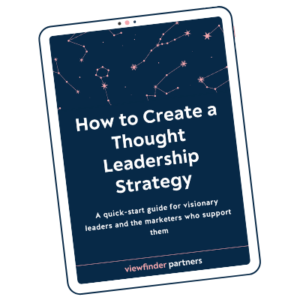>Recently, I started thinking about the world of thought leadership and public expertise as a big game of imposter syndrome.
And even in the first couple of weeks of this new year, I’ve heard a lot of rumbling (and a little grumbling) about the idea of “thought leadership.” Who decides who gets to be an expert? Do we all REALLY have to be experts?
-
I listened to Paul Jarvis and Kaleigh Moore question the idea of rampant expertise on their podcast, Creative Class.
-
Laurie Ruettiman talks about the rising tide of thought leadership and gives advice to emerging thought leaders on the Let’s Fix Work podcast.
-
And I got interesting answers to the question “What makes someone an expert?” last year on the Managing Editor podcast.
In those conversations, and in other spaces online, I’ve noticed something. The skeptics are HERE, y’all. Maybe you’re a thought leadership skeptic, too. It’s become an easy, common sport to play “thought leadership is passé.” It’s easy to poke holes in other people’s purported expertise. It’s easy to scrunch up your nose at the notion of putting your “big ideas” out there, claiming them, and in the process, asserting that they’re good.
How embarrassing.
So in this climate of rampant skepticism about the whole endeavor of being a “thought leader,” it’s not surprising that I’ve heard a lot of doubt and uncertainty in my one-on-one, offline conversations with people I consider bonafide experts.
“I don’t know what to share.”
“I’m not really…you know…an ‘expert.’”
“I’ve been writing about my tips, but it seems to get lost in all the noise.”
“People don’t really want to hear my opinions about this stuff. I don’t have any hot takes.”
We don’t know whether to be embarrassed about sharing our ideas or embarrassed about the ideas in the first place. So most people just opt out completely. They keep their ideas to themselves, they keep their heads down, and they let other people do the talking.
But here’s what I’ve realized recently. It’s something I’ve known for a long time, but I just came up with the words to talk about it.
In a noisy, ego-driven world, people don’t want more puffed-up, proud “expertise.” They want PERSPECTIVE.
And that’s what I’ve been trying to help people dig up and share. Here’s an example.
Earlier this week, I was talking to a woman who has been working in tech since the late 1980s. She has watched the evolution of technology marketing and sales since before most people even owned computers. She broke down barriers between struggling sales teams and disconnected, brand-obsessed marketers. She marched out onto golf courses to get into important conversations and push them in a new direction. And now she runs a company that helps salespeople connect with their prospects in a non-spammy, relationship-based way. Fascinating, right?! That career path and PERSPECTIVE make her immediately interesting and full of good ideas, stories and experience. I had so many questions for her.
But here’s how I see people framing that kind of 30-year career: 10 Ways to Sell More Effectively on LinkedIn. 5 Mistakes You Might Be Making in Your Sales Process.
Zzzzzzz.
I see the expertise, but where’s the perspective? How do you know? Where did you learn that?
Instead, based on a 5-minute conversation about her career, here’s what I’d want to hear from her:
How One Bad Conversation on a Golf Course in 1996 Completely Changed How I Think About Modern Sales and Marketing
How the Sales Process Has Changed as Technology Has Evolved: My Lessons from 30 Years of Marketing
What Your Sales Team Can Learn from the Tech Marketers of the 90s
Do you see where I’m going? People aren’t necessarily drawn to your purported expertise. But they completely crave your perspective. They want to know how you arrived at the opinions you hold today. They want to know about the mistakes and bad years and lost opportunities and hard lessons you lived through. They want to know your story, not just for the sake of hearing a story, but because personal stories are incredibly relatable. We’ve all had a terrible conversation with a boss that made us realize we were in the wrong place. We’ve all looked back at the early days of our careers and seen the ways we’ve evolved, our work has evolved, and our industry has evolved. If you’ve arrived, don’t tell me about the shiny, perfect destination. Tell me about the long, craggy road you took to get there.
Are you with me here? How could you share your perspective? How could you show people the trenches you’ve been in? How could you draw the path you took to earn your expertise?
That’s what I want to hear more of in 2020.





